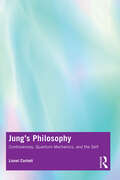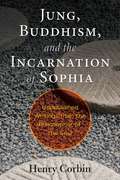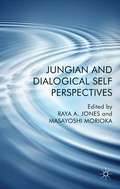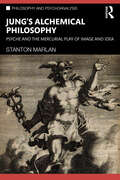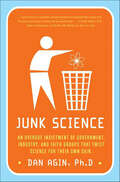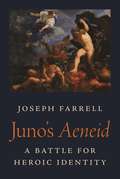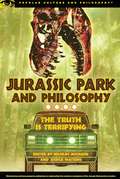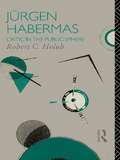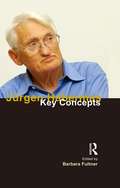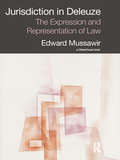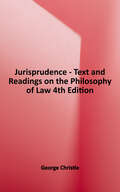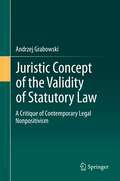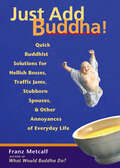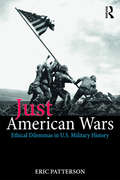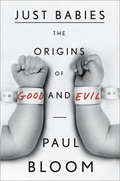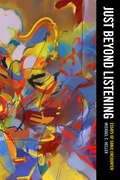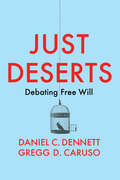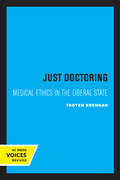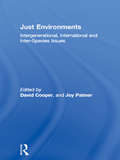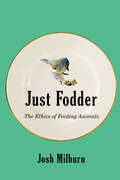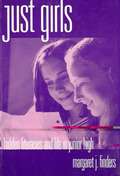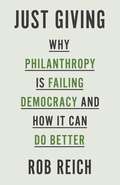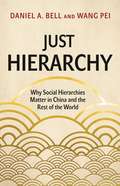- Table View
- List View
Jung's Philosophy: Controversies, Quantum Mechanics, and the Self
by Lionel Corbett‘Jung’s Philosophy’ explores some of the controversial philosophical ideas that are both explicit and implicit within Jung’s psychology, comparing the philosophical assumptions between this and other psychotherapeutic traditions. Within this book, Corbett provides a useful introduction to the philosophical issues relevant to the practice of analytical psychology, and how these are viewed by different psychotherapeutic traditions. Most of the disagreement between schools of psychotherapy, and much of the comparative literature, centres around differences in theory and technique. This book takes a different, more fundamental approach by comparing schools of thought based on their underlying philosophical commitments. The author discusses the philosophical basis of various worldviews such as idealism and realism, beliefs about the nature of the psyche and the unconscious, and the mind-brain relationship, and focuses on the way in which Jung’s psychology addresses these and related issues, including the possible relevance of quantum mechanics to depth psychology. This text will be of value to practising psychotherapists and Jungian analysts, individuals undertaking the relevant training, and students in depth psychology.
Jung, Buddhism, and the Incarnation of Sophia: Unpublished Writings from the Philosopher of the Soul
by Henry CorbinExamines the work of Carl Jung in relation to Eastern religion, the wisdom teachings of the Sophia, Sufi mysticism, and visionary spirituality • Reveals the spiritual values underlying the psychoanalytic theories of Carl Jung • Explores the role of the Gnostic Sophia with respect to Jung’s most controversial essay, “Answer to Job” • Presents new revelations about Sufi mysticism and its relationship to esoteric Buddhist practices • Shows how the underlying spiritual traditions of Islam, Judaism, and Christianity mesh with the spiritual teachings of Buddhism Henry Corbin (1903-1978) was one of the most important French philosophers and orientalists of the 20th century. In this collection of previously unpublished writings, Corbin examines the work of Carl Jung in relationship to the deep spiritual traditions of Eastern religion, the esoteric wisdom teachings of Sophia, the transformational symbolism of alchemy, and Sufi mysticism. Looking at the many methods of inner exploration in the East, including the path of the Sufi and Taoist alchemy, Corbin reveals how the modern Western world does not have its own equivalent except in psychotherapy. Expanding Jung’s findings in light of his own studies of Gnostic and esoteric Islamic traditions, he offers a unique insight into the spiritual values underlying Jung’s psychoanalytic theories. Corbin analyzes Jung’s works on Buddhism, providing his own understanding of the tradition and its relationship to Sufi mysticism, and explores the role of the Gnostic Sophia with respect to Jung’s most controversial essay, “Answer to Job.” He also studies the rapport between the Gnostic wisdom of Sophia and Buddhist teachings as well as examining Sophia through the lens of Jewish mysticism. Explaining how Islamic fundamentalists have turned their back on the mystic traditions of Sufism, Corbin reveals how totalitarianism of all kinds threatens the transformative power of the imagination and the transcendent reality of the individual soul. He shows how the underlying spiritual traditions of Islam, Judaism, and Christianity mesh with the spiritual teachings of Buddhism and reinforce the unity of the esoteric teachings of the world’s great religions. Comparing the imaginal realm with Jung’s archetypal field, he shows how we could transform the world by spiritualizing Jung’s methods, enabling us to transcend duality and make the created world divine.
Jungian and Dialogical Self Perspectives
by Raya A. Jones Masayoshi MoriokaThis collection of cutting-edge chapters contributes to the psychology of personhood especially (but not only) as applied in psychotherapy. The chapters are written from Jungian, dialogical-self, or both perspectives and give insights into the history of ideas, clinical and research applications of these perspectives in the East and West.
Jung’s Alchemical Philosophy: Psyche and the Mercurial Play of Image and Idea (Philosophy and Psychoanalysis)
by Stanton MarlanTraditionally, alchemy has been understood as a precursor to the science of chemistry but from the vantage point of the human spirit, it is also a discipline that illuminates the human soul. This book explores the goal of alchemy from Jungian, psychological, and philosophical perspectives. Jung’s Alchemical Philosophy: Psyche and the Mercurial Play of Image and Idea is a reflection on Jung’s alchemical work and the importance of philosophy as a way of understanding alchemy and its contributions to Jung’s psychology. By engaging these disciplines, Marlan opens new vistas on alchemy and the circular and ouroboric play of images and ideas, shedding light on the alchemical opus and the transformative processes of Jungian psychology. Divides in the history of alchemy and in the alchemical imagination are addressed as Marlan deepens the process by turning to a number of interpretations that illuminate both the enigma of the Philosophers’ Stone and the ferment in the Jungian tradition. This book will be of interest to Jungian analysts and those who wish to explore the intersection of philosophy and psychology as it relates to alchemy.
Junk Science: An Overdue Indictment of Government, Industry, and Faith Groups that Twist Science for Their Own Gain
by Dan AginAn overdue indictment of government, industry, and faith groups that twist science for their own gain.During the next thirty years, the American public will suffer from a rampage against reason by special interests in government, commerce, and the faith industry, and the rampage has already begun. In Junk Science, Dan Agin offers a response—a stinging condemnation of the egregious and constant warping of science for ideological gain.In this provocative, wide-ranging, and hard-hitting book, Agin argues from the center that we will pay a heavy price for the follies of people who consciously twist the public's understanding of the real world.In an entertaining but frank tone, Agin separates fact from conveniently "scientific" fiction and exposes the data faking, reality ignoring, fear mongering, and outright lying that contribute to intentionally manufactured public ignorance. Many factions twist scientific data to maintain riches and power, and Agin outs them all in sections like these:--"Buyer Beware" (genetically modified foods, aging, and tobacco companies)--"Medical Follies" (chiropractics, health care, talk therapy)--"Poison and Bombs in the Greenhouse" (pollution, warfare, global warming)--"Religion, Embryos, and Cloning"--"Genes, Behavior, and Race"We already pay a heavy price for many groups' conscious manipulation of the public's understanding of science, and Junk Science arms us with understanding, cutting through the fabric of lies and setting the record straight.
Junkware (Posthumanities #13)
by Thierry BardiniAre we made of junk? Thierry Bardini believes we are. Examining an array of cybernetic structures from genetic codes to communication networks, he explores the idea that most of culture and nature, including humans, is composed primarily of useless, but always potentially recyclable, material otherwise known as "junk." Bardini unravels the presence of junk at the interface between science fictions and fictions of science, showing that molecular biology and popular culture since the early 1960s belong to the same culture-cyberculture-which is essentially a culture of junk. He draws on a wide variety of sources, including the writings of Philip K. Dick and William S. Burroughs, interviews with scientists as well as "crackpots," and work in genetics, cybernetics, and physics to support his contention that junk DNA represents a blind spot in our understanding of life.At the same time, Junkware examines the cultural history that led to the encoding and decoding of life itself and the contemporary turning of these codes into a commodity. But he also contends that, beyond good and evil, the essential "junkiness" of this new subject is both the symptom and the potential cure.
Juno's Aeneid: A Battle for Heroic Identity (Martin Classical Lectures #36)
by Joseph FarrellA major new interpretation of Vergil's epic poem as a struggle between two incompatible versions of the Homeric heroThis compelling book offers an entirely new way of understanding the Aeneid. Many scholars regard Vergil's poem as an attempt to combine Homer’s Iliad and Odyssey into a single epic. Joseph Farrell challenges this view, revealing how the Aeneid stages an epic contest to determine which kind of story it will tell—and what kind of hero Aeneas will be.Farrell shows how this contest is provoked by the transgressive goddess Juno, who challenges Vergil for the soul of his hero and poem. Her goal is to transform the poem into an Iliad of continuous Trojan persecution instead of an Odyssey of successful homecoming. Farrell discusses how ancient critics considered the flexible Odysseus the model of a good leader but censured the hero of the Iliad, the intransigent Achilles, as a bad one. He describes how the battle over which kind of leader Aeneas will prove to be continues throughout the poem, and explores how this struggle reflects in very different ways on the ethical legitimacy of Rome’s emperor, Caesar Augustus.By reframing the Aeneid in this way, Farrell demonstrates how the purpose of the poem is to confront the reader with an urgent decision between incompatible possibilities and provoke uncertainty about whether the poem is a celebration of Augustus or a melancholy reflection on the discontents of a troubled age.
Jurassic Park and Philosophy: The Truth Is Terrifying
by Jessica Watkins Nicolas MichaudTwenty-one philosophers join forces to investigate the implications of the Jurassic Park franchise for our lives, our values, and our future. <P><P>Human beings live and thrive by modifying nature, but when do the risks of changing nature outweigh the likely benefits? If it's true that "Life will find a way," should we view any modified or newly reconstituted life as a hazard?The new scientific information we could gain by bringing back T. Rex or other dinosaurs is immense, including greater understanding of biology leading to immeasurable medical benefits, but should we choose to let sleeping dinosaurs lie? And if we do bring them back by reconstituting them from ancient DNA, are they really what they were, or is something missing? If life will find a way, then why isn't the Dodo still around?How close are we, as a matter of fact, to achieving Jurassic Park? Are we really likely to see reconstituted dinosaurs or other ancient species in the near future? How do the different forces-human curiosity, profitability, and philanthropy-interact to determine what actually happens in such cases? What moral standards should be applied to those who try to bring back lost worlds? If velociraptors could talk, what would they tell us? The idea of bringing back the dead and the powerful is not limited to biological species. It also applies to bringing back old gods, old philosophies, old institutions, and old myths. If revived and once again let loose to walk the Earth, these too may turn out to be more dangerous than we bargained for.
Jurgen Habermas: Critic in the Public Sphere (Critics of the Twentieth Century)
by Robert C. HolubThe most important intellectual in the Federal Republic of Germany for the past three decades, Habermas has been a seminal contributor to fields ranging from sociology and political science to philosophy and cultural studies. Although he has stood at the centre of concern in his native land, he has been less readily accepted outside Germany, particularly in the humanities. His theoretical work postulates the centrality of communication and understanding, and as such his strategy of debate is marked by a politically informed unity of theory and practice. Holub's book is the first detailed account of the major debates in which Habermas has engaged since the early sixties. It stems from the conviction that his critics have not understood the political strategy behind his various interventions, or the consistency that informs his intellectual activities. Habermas is viewed in dialogue with important philosophical, sociological and political currents in West Germany. Holub demonstrates how Habermas pursues a course that incorporates various aspects of his opponents' positions, while simultaneously defending perceived threats to democracy and open discussion.
Jurgen Habermas: Key Concepts (Key Concepts)
by Barbara FultnerA rare systematic thinker, Habermas has furthered our understanding of modernity, social interaction and linguistic practice, societal institutions, rationality, morality, the law, globalization, and the role of religion in multicultural societies. He has helped shape discussions of truth, objectivity, normativity, and the relationship between the human and the natural sciences. This volume provides an accessible and comprehensive conceptual map of Habermas' theoretical framework and its key concepts, including the theory of communicative action, discourse ethics, his social-political philosophy and their applications to contemporary issues. It will be an invaluable resource for both novice readers of Habermas and those interested in a more refined understanding of particular aspects of his work.
Jurisdiction in Deleuze: The Expression And Representation Of Law
by Edward MussawirJurisdiction in Deleuze: The Expression and Representation of Law explores an affinity between the philosophy of Gilles Deleuze and jurisprudence as a tradition of technical legal thought. The author addresses and reopens a central aesthetic problem in jurisprudence: the difference between the expression and the representation of law. Deleuze is taken as offering not just an important methodological recovery of an ‘expressionism’ in philosophy – specifically through Nietzsche and Spinoza – but also a surprisingly practical jurisprudence which recasts the major technical terms of jurisdiction (persons, things and actions) in terms of their distinctively expressive or performative modalities. In paying attention to law’s expression, Deleuze is thus shown to offer an account of how meaning may attach to the instrument and medium of law and how legal desire may be registered within the texture and technology of jurisdiction. Contributing both to a renewed transposition of Deleuze into contemporary legal theory, as well as to an emerging interest in law’s technology, institution and instrumentality in critical legal studies, Jurisdiction in Deleuze will be of considerable interest.
Jurisprudence, Text and Readings on the Philosophy of Law (American Casebook Series)
by George G. ChristieThis book is designed for use in courses in law schools and university departments of philosophy. It can serve as a text for basic and advanced courses and seminars. Readings include excerpts of classic works of Aristotle, Aquinas, Locke, Hobbes, Kant, Bentham, and Austin. Also included are excerpts from standard works of twentieth-century philosophers. The book explores current legal discourse with readings on topics such as sociobiology, Islamic law, the legal process school, legal feminism, critical legal studies, intersectionality and gender identity theories, law and economics, and new private law theories. It reprints leading cases on natural rights/human rights and readings from online blogs, op-ed essays, news stories and internet publications, as well as drawing on literary treatment of topics relevant to legal philosophy.
Juristic Concept of the Validity of Statutory Law: A Critique of Contemporary Legal Nonpositivism
by Malgorzata Kieltyka Andrzej GrabowskiThis book presents the theory of the validity of legal norms, aimed at the practice of law, in particular the jurisdiction of the constitutional courts. The postpositivist concept of the validity of statutory law, grounded on a critical analysis of the basic theories of legal validity elaborated up to now, is introduced. In the first part of the book a contemporary German nonpositivist conception of law developed by Ralf Dreier and Robert Alexy is analysed in order to answer the question whether the juristic concept of legal validity should include moral standards or criteria. In the second part, a postpositivist concept of legal validity and an innovative model of validity discourse, based on the juristic presumption of the validity of legal norms, are proposed. The book is a work on analytical legal theory, written from a postpositivist, detached point of view.
Jus Post Bellum and Transitional Justice
by Larry May Elizabeth EdenbergThis collection of essays brings together jus post bellum and transitional justice theorists to explore the legal and moral questions that arise at the end of war and in the transition to less oppressive regimes. Transitional justice and jus post bellum share in common many concepts that will be explored in this volume. In both transitional justice and jus post bellum, retribution is crucial. In some contexts criminal trials will need to be held, and in others truth commissions and other hybrid trials will be considered more appropriate means for securing some form of retribution. But there is a difference between how jus post bellum is conceptualized, where the key is securing peace, and transitional justice, where the key is often greater democratization. This collection of essays highlights both the overlap and the differences between these emerging bodies of scholarship and incipient law.
Just Add Buddha!: Quick Buddhist Solutions for Hellish Bosses, Traffic Jams, Stubborn Spouses, and Other Annoyances of Everyday Life
by Franz Metcalf“A diverse and edifying collection of practices to use in annoying and difficult circumstances” from the author of What Would Buddha Do? (Spirituality & Practice).Written for spiritual seekers who deal with unenlightened coworkers and inconsiderate bank tellers more often than Zen masters and Tibetan monks, this book demonstrates the practical side of Buddhism. Author Franz Metcalf shows how to weave simple vows, quick rethinks, instant relaxations, fast visualizations, and many other stripped-down Buddhist practices into every area of life. Individually, Metcalf’s techniques work as quick fixes for specific dilemmas, but woven together, they gradually strengthen one’s spiritual base when one day a habitual way of being has been quietly transformed. While not written to impress pure Buddhists, this book takes Buddhism seriously. Approachable sections on Buddhism’s rich tradition and a sprinkling of quotes from ancient scripture and contemporary teachers connect the book’s practices to the deeper wisdom underlying them. Always, Just Add Buddha! remains squarely focused on daily life, drawing out the most practical aspects of Buddhism.
Just American Wars: Ethical Dilemmas in U.S. Military History (War, Conflict and Ethics)
by Eric PattersonThis book examines the moral choices faced by U.S. political and military leaders in deciding when and how to employ force, from the American Revolution to the present day. Specifically, the book looks at discrete ethical dilemmas in various American conflicts from a just war perspective. For example, was the casus belli of the American Revolution just, and more specifically, was the Continental Congress a "legitimate" political authority? Was it just for Truman to drop the atomic bomb on Japan? How much of a role did the egos of Kennedy, Johnson and Nixon play in prolonging the Vietnam War? Often there are trade-offs that civilian and military leaders must take into account, such as General Scott’s 1847 decision to bombard the city of Veracruz in order to quickly move his troops off the malarial Mexican coast. The book also considers the moral significance and policy practicalities of different motives and courses of action. The case studies provided highlight the nuances and even limits of just war principles, such as just cause, right intention, legitimate authority, last resort, likelihood of success, discrimination, and proportionality, and principles for ending war such as order, justice, and conciliation. This book will be of interest for students of just war theory, ethics, philosophy, American history and military history more generally.
Just Babies: The Origins of Good and Evil
by Paul Bloom<P>A leading cognitive scientist argues that a deep sense of good and evil is bred in the bone. From John Locke to Sigmund Freud, philosophers and psychologists have long believed that we begin life as blank moral slates. Many of us take for granted that babies are born selfish and that it is the role of society--and especially parents--to transform them from little sociopaths into civilized beings. <P>In Just Babies, Paul Bloom argues that humans are in fact hardwired with a sense of morality. Drawing on groundbreaking research at Yale, Bloom demonstrates that, even before they can speak or walk, babies judge the goodness and badness of others' actions; feel empathy and compassion; act to soothe those in distress; and have a rudimentary sense of justice. <P>Still, this innate morality is limited, sometimes tragically. We are naturally hostile to strangers, prone to parochialism and bigotry. Bringing together insights from psychology, behavioral economics, evolutionary biology, and philosophy, Bloom explores how we have come to surpass these limitations. <P> Along the way, he examines the morality of chimpanzees, violent psychopaths, religious extremists, and Ivy League professors, and explores our often puzzling moral feelings about sex, politics, religion, and race. In his analysis of the morality of children and adults, Bloom rejects the fashionable view that our moral decisions are driven mainly by gut feelings and unconscious biases. <P>Just as reason has driven our great scientific discoveries, he argues, it is reason and deliberation that makes possible our moral discoveries, such as the wrongness of slavery. Ultimately, it is through our imagination, our compassion, and our uniquely human capacity for rational thought that we can transcend the primitive sense of morality we were born with, becoming more than just babies. <P>Paul Bloom has a gift for bringing abstract ideas to life, moving seamlessly from Darwin, Herodotus, and Adam Smith to The Princess Bride, Hannibal Lecter, and Louis C.K. Vivid, witty, and intellectually probing, Just Babies offers a radical new perspective on our moral lives. <P><b>A New York Times Bestseller</b>
Just Beyond Listening: Essays of Sonic Encounter (California Studies in Music, Sound, and Media #5)
by Michael C. HellerJust Beyond Listening asks how we might think about encounters with sound that complicate standard accounts of aurality. In a series of essays, Michael C. Heller considers how sound functions in dialogue with a range of sensory and affective modalities, including physical co-presence, textual interference, and spectral haunting. The text investigates sound that is experienced in other parts of the body, altered by cross-wirings of the senses, weaponized by the military, or mediated and changed by cultural practices and memory. Building on recent scholarship in sound studies and affect theory, Heller questions not only how sound propagates acoustically but how sonic presences temper our total experience of the world around us.
Just Deserts: Debating Free Will
by Daniel C. Dennett Gregg D. CarusoThe concept of free will is profoundly important to our self-understanding, our interpersonal relationships, and our moral and legal practices. If it turns out that no one is ever free and morally responsible, what would that mean for society, morality, meaning, and the law? Just Deserts brings together two philosophers – Daniel C. Dennett and Gregg D. Caruso – to debate their respective views on free will, moral responsibility, and legal punishment. In three extended conversations, Dennett and Caruso present their arguments for and against the existence of free will and debate their implications. Dennett argues that the kind of free will required for moral responsibility is compatible with determinism – for him, self-control is key; we are not responsible for becoming responsible, but are responsible for staying responsible, for keeping would-be puppeteers at bay. Caruso takes the opposite view, arguing that who we are and what we do is ultimately the result of factors beyond our control, and because of this we are never morally responsible for our actions in the sense that would make us truly deserving of blame and praise, punishment and reward. Just Deserts introduces the concepts central to the debate about free will and moral responsibility by way of an entertaining, rigorous, and sometimes heated philosophical dialogue between two leading thinkers.
Just Doctoring: Medical Ethics in the Liberal State
by Troyen A. BrennanThis title is part of UC Press's Voices Revived program, which commemorates University of California Press’s mission to seek out and cultivate the brightest minds and give them voice, reach, and impact. Drawing on a backlist dating to 1893, Voices Revived makes high-quality, peer-reviewed scholarship accessible once again using print-on-demand technology. This title was originally published in 1991.
Just Environments: Intergenerational, International and Inter-Species Issues
by David E. Cooper Joy A. PalmerCan we do what we want with other species? How do conflicting international interests affect global issues? What do we owe the next generation? Just Environments investigates these questions and the ethics which lie at their core.
Just Fodder: The Ethics of Feeding Animals
by Josh MilburnAnimal lovers who feed meat to other animals are faced with a paradox: perhaps fewer animals would be harmed if they stopped feeding the ones they love. Animal diets do not raise problems merely for individuals. To address environmental crises, health threats, and harm to animals, we must change our food systems and practices. And in these systems, animals, too, are eaters.Moving beyond what humans should eat and whether to count animals as food, Just Fodder answers ethical and political questions arising from thinking about animals as eaters. Josh Milburn begins with practical dilemmas about feeding the animals closest to us, our pets or animal companions. The questions grow more complicated as he considers relationships with more distance – questions about whether and how to feed garden birds, farmland animals who would eat our crops, and wild animals. Milburn evaluates the nature and circumstances of our relationships with animals to generate a novel theory of animal rights.Looking past arguments about what we can and cannot do to other beings, Just Fodder asks what we can, should, and must do for them, laying out a fuller range of our ethical obligations to other animals.
Just Girls: Hidden Literacies and Life in Junior High
by Margaret J. FindersHighlighting the social importance of friendship, family and social networks in girls' sense of themselves, she suggests that literacy plays an important role in maintaining friendship groups and in the construction of the self.
Just Giving: Why Philanthropy Is Failing Democracy and How It Can Do Better
by Rob ReichThe troubling ethics and politics of philanthropyIs philanthropy, by its very nature, a threat to today’s democracy? Though we may laud wealthy individuals who give away their money for society’s benefit, Just Giving shows how such generosity not only isn’t the unassailable good we think it to be but might also undermine democratic values and set back aspirations of justice. Big philanthropy is often an exercise of power, the conversion of private assets into public influence. And it is a form of power that is largely unaccountable, often perpetual, and lavishly tax-advantaged. The affluent—and their foundations—reap vast benefits even as they influence policy without accountability. And small philanthropy, or ordinary charitable giving, can be problematic as well. Charity, it turns out, does surprisingly little to provide for those in need and sometimes worsens inequality.These outcomes are shaped by the policies that define and structure philanthropy. When, how much, and to whom people give is influenced by laws governing everything from the creation of foundations and nonprofits to generous tax exemptions for donations of money and property. Rob Reich asks: What attitude and what policies should democracies have concerning individuals who give money away for public purposes? Philanthropy currently fails democracy in many ways, but Reich argues that it can be redeemed. Differentiating between individual philanthropy and private foundations, the aims of mass giving should be the decentralization of power in the production of public goods, such as the arts, education, and science. For foundations, the goal should be what Reich terms “discovery,” or long-time-horizon innovations that enhance democratic experimentalism. Philanthropy, when properly structured, can play a crucial role in supporting a strong liberal democracy.Just Giving investigates the ethical and political dimensions of philanthropy and considers how giving might better support democratic values and promote justice.
Just Hierarchy: Why Social Hierarchies Matter in China and the Rest of the World
by Daniel A. BellA trenchant defense of hierarchy in different spheres of our lives, from the personal to the politicalAll complex and large-scale societies are organized along certain hierarchies, but the concept of hierarchy has become almost taboo in the modern world. Just Hierarchy contends that this stigma is a mistake. In fact, as Daniel Bell and Wang Pei show, it is neither possible nor advisable to do away with social hierarchies. Drawing their arguments from Chinese thought and culture as well as other philosophies and traditions, Bell and Wang ask which forms of hierarchy are justified and how these can serve morally desirable goals. They look at ways of promoting just forms of hierarchy while minimizing the influence of unjust ones, such as those based on race, sex, or caste.Which hierarchical relations are morally justified and why? Bell and Wang argue that it depends on the nature of the social relation and context. Different hierarchical principles ought to govern different kinds of social relations: what justifies hierarchy among intimates is different from what justifies hierarchy among citizens, countries, humans and animals, and humans and intelligent machines. Morally justified hierarchies can and should govern different spheres of our social lives, though these will be very different from the unjust hierarchies that have governed us in the past.A vigorous, systematic defense of hierarchy in the modern world, Just Hierarchy examines how hierarchical social relations can have a useful purpose, not only in personal domains but also in larger political realms.
